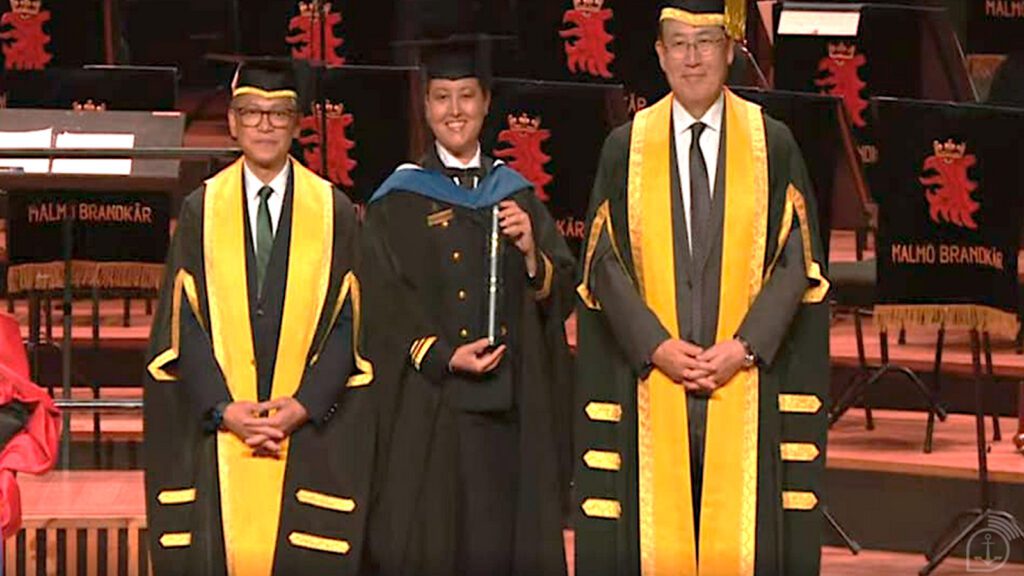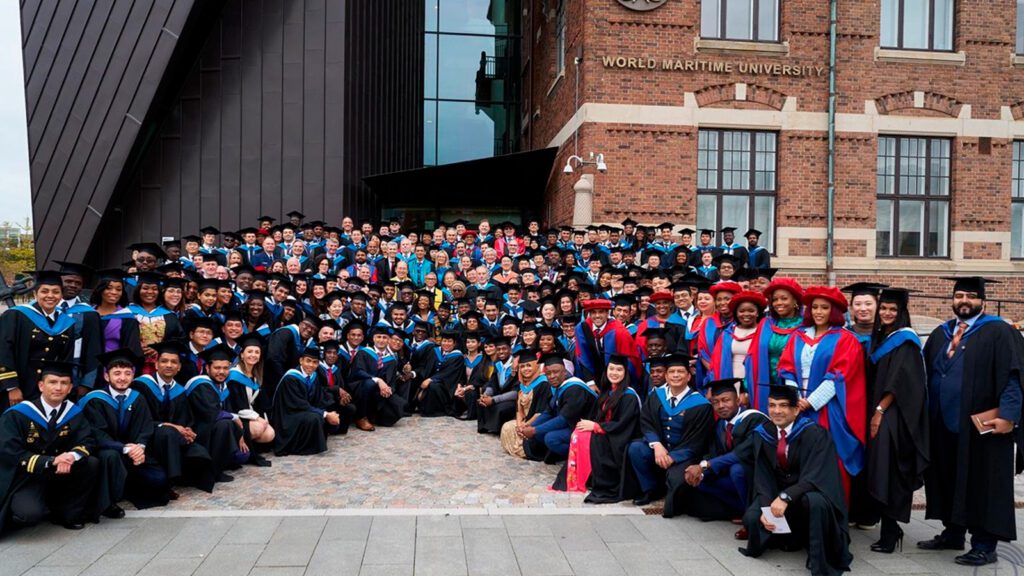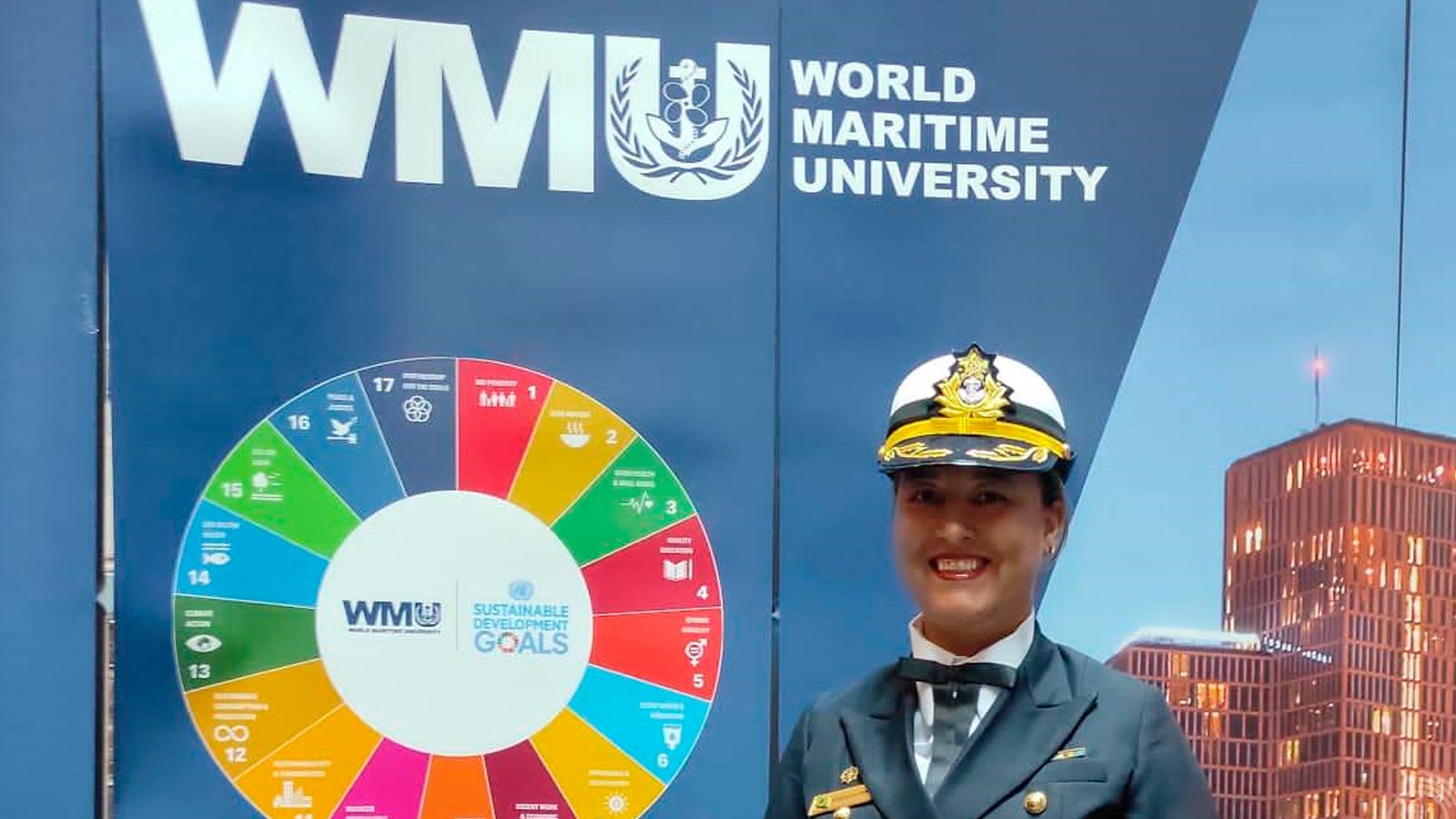Corvette Captain Adriana Pina received a Postgraduate Certificate in Maritime Energy
By Marine Ranger (RM2-T) João Stilben – Brasília, DF
In 2017, the United Nations (UN) declared that the period between 2021 and 2030 will be known as the “Decade of Ocean Science for Sustainable Development”. The UN’s aim is to create a global mindset in favor of the seas, through scientific research and technological innovations related to the cleanliness, safety and sustainability of the oceans. In this context, the Brazilian Navy (MB) is investing in military personnel to specialize in the subject, especially those who work directly with research related to the sea and Brazil’s maritime and port infrastructure.
As a result of this investment in training, the head of the Port Captaincy Delegation in Itacuruçá, and Advisor to the Port Authority in Itaguaí (RJ), Corvette Captain (Technical Staff) Adriana Pina, received in Sweden, from the hands of the Secretary-General of the International Maritime Organization (IMO), Kitack Lim, the Postgraduate Diploma in Maritime Energy from the World Maritime University (WMU).
The WMU recognizes as “maritime and ocean leaders of tomorrow” those who have the skills to contribute to maritime and ocean issues in their home countries. The University is considered by the United Nations General Assembly to be a center of excellence in maritime and ocean education for research, training and economic development, while promoting the role of women in the sector.
Specifically, the Postgraduate program in Maritime Energy trains professionals with technical, socio-economic and environmental knowledge, related to IMO regulations, on the prevention of water and air pollution caused by vessels, as well as potential mitigation measures to achieve a low-carbon and energy-efficient maritime future. The course was aimed at people with a technical profile (such as naval architects, deck engineers, surveyors), as well as those with a background in ship operation, superintendents and managers of ports and shipyards.

In an interview with Agência Marinha de Notícias (AgMN), Corvette Captain Adriana Pina talked about her achievement at WMU, from joining the Swedish institution to how the course will help promote sustainable development in our country. Check it out!
AgMN – How did you get into the course and what were your initial experiences?
CC (T) Adriana Pina – I saw the Navy News Bulletin, took the admission exam at the World Maritime University (WMU), was approved and started the distance learning course. All the modules were taken through WMU’s online platform, under the supervision of a Tutor Professor. We also took part in online seminars with experts in the maritime field. At the end, the class was divided into groups and we prepared a seminar to be presented as part of the assessment.
Shortly after the course began, as MB’s representative on the Port Authority Council, I suggested the inclusion of a topic on the actions taken with a view to sustainability in the ports and terminals within the jurisdiction of the Port Captaincy Police Station in Itacuruçá, which was accepted and promptly implemented. Porto Sudeste made the first presentation, with relevant information on the results of the work carried out, making it possible to share the experiences acquired and implemented.
AgMN – How can the knowledge acquired during the course help, through your work, to improve and expand our maritime-related institutions?
CC (T) Adriana Pina – Receiving, for example, a ship that uses a new technology to reduce greenhouse gas (GHG) emissions, at a terminal in the jurisdiction of which I am currently the Delegate, proved the importance of personal training and keeping up to date with the international maritime scenario.
I can also say that not only ports and terminals, but MB Military Organizations (OM) can contribute to sustainable development. For example, by installing photovoltaic panels, collecting rainwater to reduce water consumption, planning the use of vehicles and other means to reduce air pollution, educational talks on the subject of sustainability, among other measures that can be implemented and that can result, in the long term, in a reduction in the OM’s expenses.
AgMN – The IMO’s GHG strategy calls for a reduction in carbon dioxide (CO2) emissions of 40% by 2030 and 70% by 2050, compared to 2008 levels. In this postgraduate course, how were innovative and sustainable technologies dealt with?
CC (T) Adriana Pina – The 17 Sustainable Development Goals require effort and commitment from each country in order to be achieved, and the main difficulty discussed in the course was the need to support less developed countries and the specificities of each region.
AgMN – Personally, what was it like to take part in this postgraduate course, in terms of curriculum enrichment?
CC (T) Adriana Pina – Taking the course enabled me to train in a subject that is being discussed nationally and internationally, with the publication of numerous documents by the International Maritime Organization. Finally, my degree in Nautical Sciences from the Centro de Instrução Almirante Graça Aranha (CIAGA), and my master’s degree from the Instituto Alberto Luiz Coimbra de Pós-Graduação e Pesquisa de Engenharia, linked to the Federal University of Rio de Janeiro, provided me with the academic basis for taking the course, with an above-average final grade.
Since 2016, I have sought to raise MB’s profile by taking part in seminars and courses and presenting academic papers. I am one of the representatives of the Young Professionals Group of Brazil, which is a subgroup of the Young Professionals Commission (YP-Com International), created in 2021.
AgMN – How can the country work on its educational institutions to achieve a level of excellence equal to or similar to that of the WMU, within our reality and customs?
CC (T) Adriana Pina – The subject of sustainability can be included in school curricula, so that citizens with a greater commitment to the environment can be formed. It is well known that we are currently living in an era of the use of new technologies, which at the same time triggers a process of unbridled high consumption, generating waste and a large amount of garbage. I can cite the example presented by Porto Sudeste, which transformed tons of railings from cargo transport equipment into reclining trolleys to transport materials to the garbage collectors of Itaguaí. This also included concern for the ergonomics of the workers during manufacture. This is yet another example of the Ports’ and terminals’ commitment to the issue.

As for higher education institutions, the topic can also be included so that this new generation can implement measures that will certainly contribute to reducing the effects of global climate change.
